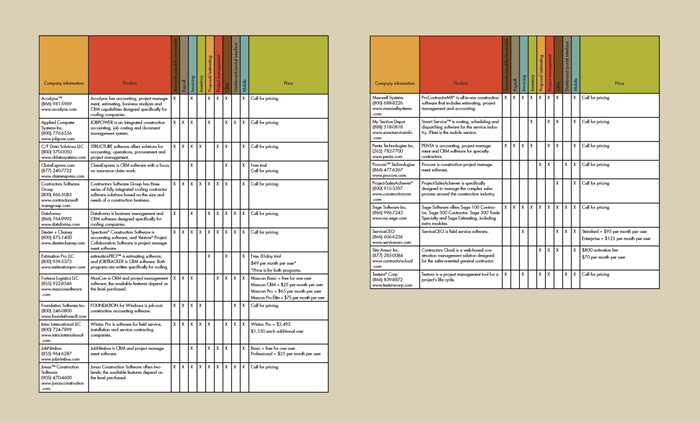Managing a roofing company is not easy, and many roofing contractors don't want to spend an inordinate amount of time with office and project administration. Additionally, roofing contractors are increasingly interested in customer relationship and sales-tracking software—referred to as customer relationship management (CRM)—to help manage the customer service side of their businesses.
There are products that integrate business and CRM features, and some allow buyers to customize their packages to only pay for the applications they want. And because each roofing company has distinctive needs, NRCA has compiled a list of business-related software applications to help you distinguish the wide variety of products available. Most of the information was found in various trade publications and on companies' websites; it is not meant to be all-inclusive.
The information is categorized into the following columns in the figure:
Accounting
The first four categories—accounts payable/receivable, payroll, invoicing and inventory—are accounting features and typically most of the profiled accounting software products have these features. Some products include general ledger and financial reporting capabilities; purchase order management; job-cost data analysis; aging information; check writing; and maintenance of state and federal documents such as I-9, W-2 and W-4 forms. Additionally, many of the software applications have the ability to charge inventory and/or equipment by project.

To view the figure as a PDF, click here.
One advantage to having accounting software is the ability to generate reports that can summarize job-cost history; show budget vs. actual cost; track project commissions; and reflect the status of billings, purchase orders, lien waivers and change orders.
There also are a couple of applications that work with different currencies and integrate third-party software, such as QuickBooks.™
Proposal/estimating
Some business/accounting software products incorporate estimating. They have features that perform take-offs from construction drawings, integrate with computer-assisted drawing programs, have sketching and drawing capabilities, and create proposals.
Some applications tie in estimation with accounting and project management data, helping with job-cost analysis.
Project management
Project management software generally manages the bidding process and project status and tracks work schedules. It can maintain project documentation, such as submittals, requests for information, daily logs, meeting minutes, punch lists, drawings and photos. Many project management applications also include the ability to manage subcontracts.
A couple of the products feature dispatching fleet management and routing and/or mapping services.
CRM
CRM software applications help automate, maintain and streamline customer relations and can be used for marketing. CRM systems vary widely in capabilities and pricing, from basic contact management to elaborate packages for sales, services and marketing.
The primary purpose of CRM software is to consolidate customer information so users can better organize and manage customer relationships. Additionally, these applications automate common processes and provide tools for monitoring performance and productivity. Systems vary, but most CRM software will include the following basic functions:
Dashboard/portal interface
A dashboard is a user interface that organizes and presents information in a way that is easy to read on a single screen. The dashboard concept is akin to a control panel for a software application. One advantage of a dashboard is it provides real-time information for the user. Many business and project management software packages have dashboard interfaces. Some products will allow users to customize their dashboard interfaces, and one company offers a multilingual capability for users to view their applications' interfaces in English, Spanish or Portuguese.
Mobile
The trend in the construction industry is users want to be able to access information when they are away from the office, especially when they are on a job site. You will notice all the listed software applications have some type of mobile viewing capability.
Pricing
Most companies want you to contact them for pricing information because the companies offer different levels of service, multiple add-on features or prices depending on the number of users. But a majority of products offer free demos so you can get a cursory look at the products. Training also is available from some companies.
Helping you
Listed companies were found by researching advertisements in magazines that market to the construction industry and searching the Internet. NRCA attempted to include products for different-sized companies and varying price ranges. Keep in mind, this list is not all-inclusive, and inclusion or exclusion of any software does not imply an endorsement or condemnation by NRCA.
We encourage you to review the products, visit software companies' websites and contact the companies for further information.
Joan P. Crowe, AIA, is an NRCA director of technical services.
For articles related to this topic, see:
"The future is now," February 2013 issue
"Seeking assistance,"August 2008 issue
COMMENTS
Be the first to comment. Please log in to leave a comment.